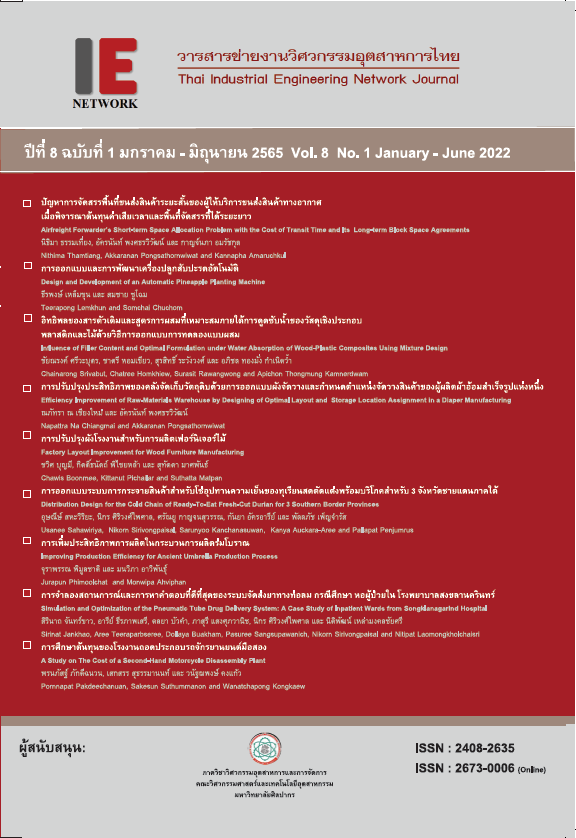Airfreight Forwarder’s Short-term Space Allocation Problem with the Cost of Transit Time and Its Long-term Block Space Agreements
Main Article Content
Abstract
This article considers the carrier selection problem and the short-term freight allocation problem for an air freight forwarder, when the total demand exceeds the total space from the block space agreement (BSA). We propose a mixed-integer linear programming model for these two problems, whose decisions greatly affect the freight forwarder’s cost. Our model considers both the freight charge and the cost of transit time so that a direct flight is preferred to a non-direct flight. In the case study, we apply our model to the actual export demand during April 2020-July 2021; the top five export traffic lanes are Narita, Hong Kong, Shanghai, Manila and Jakarta, respectively. When we compare to the actual operations during the average month in each lane, we find that our model reduces the cost by 3.05% or approximately 15 million THBs. Furthermore, we perform sensitivity analysis with respect to the capacity per pallet and the cost of transit. We find that as the capacity per pallet increases, the cost decreases. When the transit cost is sufficiently high, the direct flights are always selected; therefore, the freight charge remains the same.
Article Details

This work is licensed under a Creative Commons Attribution-NonCommercial-NoDerivatives 4.0 International License.
บทความ ข้อมูล เนื้อหา รูปภาพ ฯลฯ ที่ได้รับการตีพิมพ์ในวารสารฯ ถือเป็นลิขสิทธิ์ของวารสารฯ หากบุคคลหรือหน่วยงานใดต้องการนำทั้งหมดหรือส่วนหนึ่งส่วนใดไปเผยแพร่ต่อหรือเพื่อกระทำการใดๆ จะได้รับอนุญาต แต่ห้ามนำไปใช้เพื่่อประโยชน์ทางธุรกิจ และห้ามดัดแปลง
References
Kuancheng Huang and Wenhou Chi, “A Lagrangian Relaxation Based Heuristic for the Consolidation Problem of Airfreight Forwarders,” Transportation Research Part C, vol. 15, pp. 235-245, 2007.
Boeing Company: World air cargo forecast 2018–2037 http://www.boeing.com/commercial/market/cargo-forecast/ (2018). Accessed 01 July 2020.
International Air Transport Association, “Low Density Cargo,” Cargo Agent’s Handbook Resolution 801-Worldwide, 44th ed. Montreal: Geneva, 2021, pp. 502.
Ferguson, Kara, Hoffman, and Sherry, “Estimating Domestic US Airline Cost of Delay Based on European Model,” Transportation Research Part C, vol. 33, pp. 311-323, 2013.
Feng, B., Li, Y., Shen, Z.: “Air Cargo Operations: Literature Review and Comparison with Practices,” Transportation Research Part C, vol. 56, pp. 263–280, 2015.
Amaruchkul, K., Cooper, W., Gupta, D. “Single-leg Air-cargo Revenue Management.” Transportation Science, vol. 41, pp. 457–469, 2007.
Han, D.L., Tang, L.C., Huang, H.C. “A Markov Model for Single-leg Air Cargo Revenue Management under a Bid-price Policy” European Journal of Operational Research, vol. 200, pp. 800–811, 2010.
Moussawi-Haidar, L. “Optimal Solution for a Cargo Revenue Management Problem with Allotment and Spot Arrivals.” Transportation Research Part E, vol. 72, pp. 173–191, 2014.
Levin, Y., Nediak, M., Topaloglu, H. ”Cargo capacity management with allotments and spot market demand.” Operations Research, vol. 60, pp. 351–365, 2012


